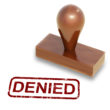If You Don’t Follow Your Doctor’s Treatment Orders, You Can Be Denied Disability Benefits.
All too often people who are applying for Social Security disability blow up their own case by making fundamental and avoidable mistakes. “One of the worst mistakes (and one that we see frequently) is not following a treatment plan prescribed by a doctor, or not receiving medical treatment at all” says Nash Attorney Dan Rosen. “The Social Security Administration (SSA) frequently denies claims when it believes you would be able to work if you went to therapyor took the medicine your doctor prescribed. If you have a disability that prevents you from working, our strongest advice is to be proactive, see your doctor early and often, and comply with your doctor’s prescribed treatment.”
There are many myths about how disability cases are decided, and rumors about “tricks” to get approved for benefits. But it most often comes down to one thing: Social Security disability cases are decided mainly based on the medical evidence in the record. That is, does the medical evidence match up with what you are telling Social Security? At a hearing, the Administrative Law Judge who is deciding your case is determining if believes what you say about your disabilities. If you have not followed your prescribed treatment plan, it is unlikely that the SSA will believe that your condition is as severe or limiting as you say it is. If, however, you have a well-established record of regularly seeing you doctor and complying with the prescribed treatment options, the agency will find more likely agree that your condition is severe and disabling. (For more on credibility and disability hearings read: “Will Your Disability Case Pass the Sniff Test?”)
Last year, the SSA created a new and more restrictive regulation—SSR 18-3P—which details how benefits may be denied for not following prescribed treatments. It has three threshold conditions for denying disability benefits:
Condition 1: The SSA finds that you would otherwise be eligible for benefits based on your impairment. (In other words, they agree that your disability prevents you from being able to hold a job.)
Condition 2: One or more of your doctors has prescribed a course of treatment for your impairment.
Condition 3: The SSA has evidence that you did not follow that course of treatment.
Rosen points out that “in our office, we hear many excuses for not following a doctor’s orders. Here are a few examples:
‘There is nothing else the doctor could do for me.’
‘I have a mental condition and I am afraid they will put me in an institution.’
‘I called, but it will be months before I can get an appointment.’
There is almost no chance that the SSA will be swayed by these or other non-compliance arguments. While we understand that receiving treatment can be difficult or that our clients may be apprehensive, think about it this way: judges see people every day in similar situations who are, in fact, receiving treatment and following their doctor’s orders. Right or wrong, they can and will compare you to those individuals..
“Another troublesome situation that we encounter is clients who tweak their own treatment plan,” Rosen observes. “This is another way to lose your claim for benefits. Often claimants will tell us that the treatment wasn’t working or point to unwanted side effects as a justification for deviating from their doctor’s orders. If that is the case, tell your doctor,” Rosen says. “Your doctor may be able to offer you an alternative treatment plan and document the problems with your treatment. But making changes on your own is a bad strategy.”
To understand the best strategy to win your Social Security disability claim, we urge you to contact us for a free evaluation of your case.



